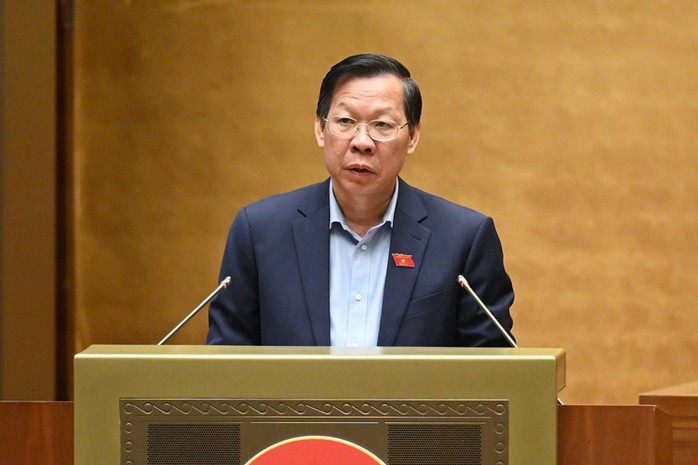The National Assembly has passed the amended Special Consumption Tax Law, adding sugary beverages with a sugar content exceeding 5g per 100ml—according to Vietnam Standards—to the list of items subject to special consumption tax (SCT).
Mr. Phan Van Mai, chairman of the National Assembly’s Finance and Budget Committee, acknowledged that some opinions called for a more thorough assessment of the impact of taxing sugary beverages to develop appropriate measures or an implementation roadmap.

Mr Phan Van Mai, chairman of the National Assembly’s Finance and Budget Committee, presented a report on the reception and explanation of the draft law. Photo: Pham Thang
Regarding this issue, the National Assembly Standing Committee (NASC) emphasized that subjecting sugary beverages to the SCT aims to institutionalize the Party’s policy on public health protection, in line with recommendations from the World Health Organization (WHO), the United Nations Children’s Fund (UNICEF), and the Ministry of Health.
Taxing sugary beverages under the SCT is considered necessary and aligns with international practices to guide production and consumption while broadening the tax base.
In response to NASC revised the draft law to delay the SCT's application on these products until 2027, with an initial tax rate of 8%, increasing to 10% from January 1, 2028.
Some opinions proposed extending the SCT to other sugary products and expanding the tax scope to include beverages containing synthetic sweeteners, with tax rates equal to or higher than those for products using cane sugar.
The NASC emphasized that adding other sugary products to the SCT list requires careful evaluation, with a roadmap to minimize the impact on business recovery and people’s livelihoods. The draft law presented by the Government at this session did not include studies or assessments of additional products. Therefore, the NASC recommended that the Government continue researching and assessing potential impacts to propose amendments if necessary at an appropriate time.
Regarding air conditioners subject to the SCT, the NASC adopted delegates’ opinions and agreed with the drafting agency’s proposal to apply the tax to units with a capacity exceeding 24,000 BTU up to 90,000 BTU, excluding those with a capacity of 24,000 BTU or below and those exceeding 90,000 BTU.
The newly passed law adds air conditioners with a capacity exceeding 24,000 BTU up to 90,000 BTU to the SCT list, with a tax rate of 10%. This issue attracted significant attention from National Assembly delegates during discussions, as many argued that air conditioners are essential household items rather than luxury goods and should not be subject to the SCT.
The amended SCT Law also adjusts SCT rates for alcohol and beer, implementing a phased approach compared to the initial proposal.
For alcoholic beverages with 20% alcohol content or more, as well as beer, the tax rate will start at 65% in 2026, increasing by 5 percentage points annually to reach 90% by 2031. For alcohol under 20%, the rate will begin at 35% in 2026, rising annually to 60% by 2031.
According to Mr. Phan Van Mai, some opinions supported the phased tax implementation and progressively higher tax rates for alcohol, beer, tobacco, and sugary beverages but emphasized the need to assess the social impact of the tax increase roadmap.
On this matter, the NASC stressed that amending the law to raise tax rates for items subject to the SCT aims to institutionalize the Party and State’s policies on protecting and improving public health while fulfilling international commitments.
The law will take effect on January 1, 2026.
Regarding the Special Consumption Tax on gasoline, the National Assembly Standing Committee noted that, in the long term, a comprehensive revision of both the SCT and the environmental protection tax is necessary to ensure a reasonable taxation framework in line with international practices.
In the context of implementing synchronized measures to effectively meet the Vietnamese Government’s commitments at COP26, alongside environmental protection tax regulations, applying the SCT on gasoline remains necessary at this stage.





Bạn không thể gửi bình luận liên tục. Xin hãy đợi
60 giây nữa.